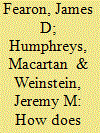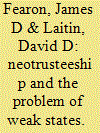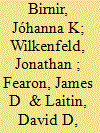|
|
|
Sort Order |
|
|
|
Items / Page
|
|
|
|
|
|
|
| Srl | Item |
| 1 |
ID:
155228


|
|
|
|
|
| Summary/Abstract |
This essay sketches an explanation for the global spread of civil war up to the early 1990s and the partial recession since then, arguing that some of the decline is likely due to policy responses by major powers working principally through the United Nations. Unfortunately, the spread of civil war and state collapse to the Middle East and North Africa region in the last fifteen years has posed one set of problems that the current policy repertoire cannot address well–for several reasons, conflicts in this region are resistant to “treatment” by international peacekeeping operations–and has highlighted a second, deeper problem whose effects are gradually worsening and for which there does not appear to be any good solution within the constraints of the present UN system. That is, for many civil war–torn or “postconflict” countries, third parties do not know how to help locals build a self-governing, self-financing state within UN-recognized borders or, in some cases, any borders.
|
|
|
|
|
|
|
|
|
|
|
|
|
|
|
|
| 2 |
ID:
160509


|
|
|
|
|
| Summary/Abstract |
I consider a model in which two states choose how much to arm and whether to attack in successive periods. Arms are useful not only for deterrence or taking territory, but also because they influence the resolution of a set of disputed issues. States can cooperate on the issues by limiting military competition, but only as far as an endogenous “war constraint” allows. Factors determining the tightness of the war constraint imply hypotheses about the international determinants of military effort and thus the costs of anarchy. The strategic logic differs from standard security-dilemma arguments, in which the costs of anarchy are associated with conflict between status quo states that are uncertain about others' territorial revisionism. Here, inefficiency arises because arming to deter lowers a state's value for living with the status quo, which creates a security externality and a feedback loop. The model both synthesizes and revises a range of theoretical arguments about the determinants of interstate cooperation and conflict.
|
|
|
|
|
|
|
|
|
|
|
|
|
|
|
|
| 3 |
ID:
140805


|
|
|
|
|
| Summary/Abstract |
Social cooperation is critical to a wide variety of political and economic outcomes. For this reason, international donors have embraced interventions designed to strengthen the ability of communities to solve collective-action problems, especially in post-conflict settings. We exploit the random assignment of a development program in Liberia to assess the effects of such interventions. Using a matching funds experiment we find evidence that these interventions can alter cooperation capacity. However, we observe effects only in communities in which, by design, both men and women faced the collective action challenge. Focusing on mechanisms, we find evidence that program effects worked through improvements in mobilization capacity that may have enhanced communities’ ability to coordinate to solve mixed gender problems. These gains did not operate in areas where only women took part in the matching funds experiment, possibly because they could rely on traditional institutions unaffected by the external intervention. The combined evidence suggests that the impact of donor interventions designed to enhance cooperation can depend critically on the kinds of social dilemmas that communities face, and the flexibility they have in determining who should solve them.
|
|
|
|
|
|
|
|
|
|
|
|
|
|
|
|
| 4 |
ID:
076416


|
|
|
|
|
| Publication |
2007.
|
| Summary/Abstract |
The White House still avoids the label, but by any reasonable historical standard, the Iraqi civil war has begun. The record of past such wars suggests that Washington cannot stop this one -- and that Iraqis will be able to reach a power-sharing deal only after much more fighting, if then. The United States can help bring about a settlement eventually by balancing Iraqi factions from afar, but there is little it can do to avert bloodshed now.
|
|
|
|
|
|
|
|
|
|
|
|
|
|
|
|
| 5 |
ID:
052051


|
|
|
| 6 |
ID:
064823


|
|
|
| 7 |
ID:
137031


|
|
Socially relevant ethnic groups, ethnic structure, and AMAR
/ Birnir, Jóhanna K; Wilkenfeld, Jonathan ; Fearon, James D ; Laitin, David D, Gurr, Ted Robert, Brancati, Dawn Saideman, Stephen M, Pate, Amy, Hultquist, Agatha S
|

|
|
|
|
| Summary/Abstract |
Protracted conflicts over the status and demands of ethnic and religious groups have caused more instability and loss of human life than any other type of local, regional, and international conflict since the end of World War II. Yet we still have accumulated little in the way of accepted knowledge about the ethnic landscape of the world. In part this is due to empirical reliance on the limited data in the Minorities at Risk (MAR) project, whose selection biases are well known. In this article we tackle the construction of a list of ‘socially relevant’ ethnic groups meeting newly justified criteria in a dataset we call AMAR (A for All). We find that one of the principal difficulties in constructing the list is determining the appropriate level of aggregation for groups. To address this issue, we enumerate subgroups of the commonly recognized groups meeting our criteria so that scholars can use the subgroup list as one reference in the construction of the list of ethnic groups most appropriate for their study. Our conclusion outlines future work on the data using this expanded dataset on ethnic groups.
|
|
|
|
|
|
|
|
|
|
|
|
|
|
|
|
| 8 |
ID:
107168


|
|
|
| 9 |
ID:
052860


|
|
|
|
|
|
|
|